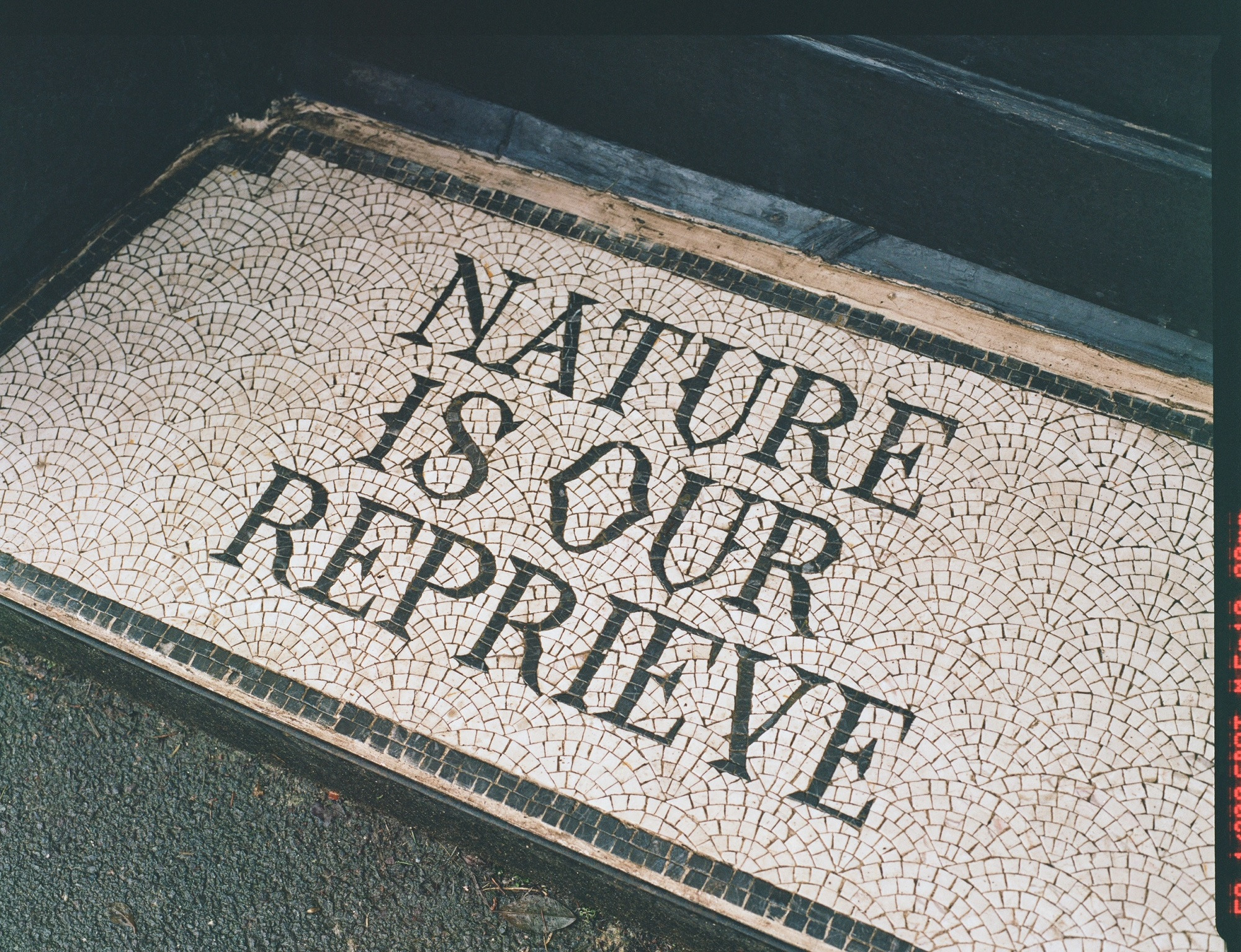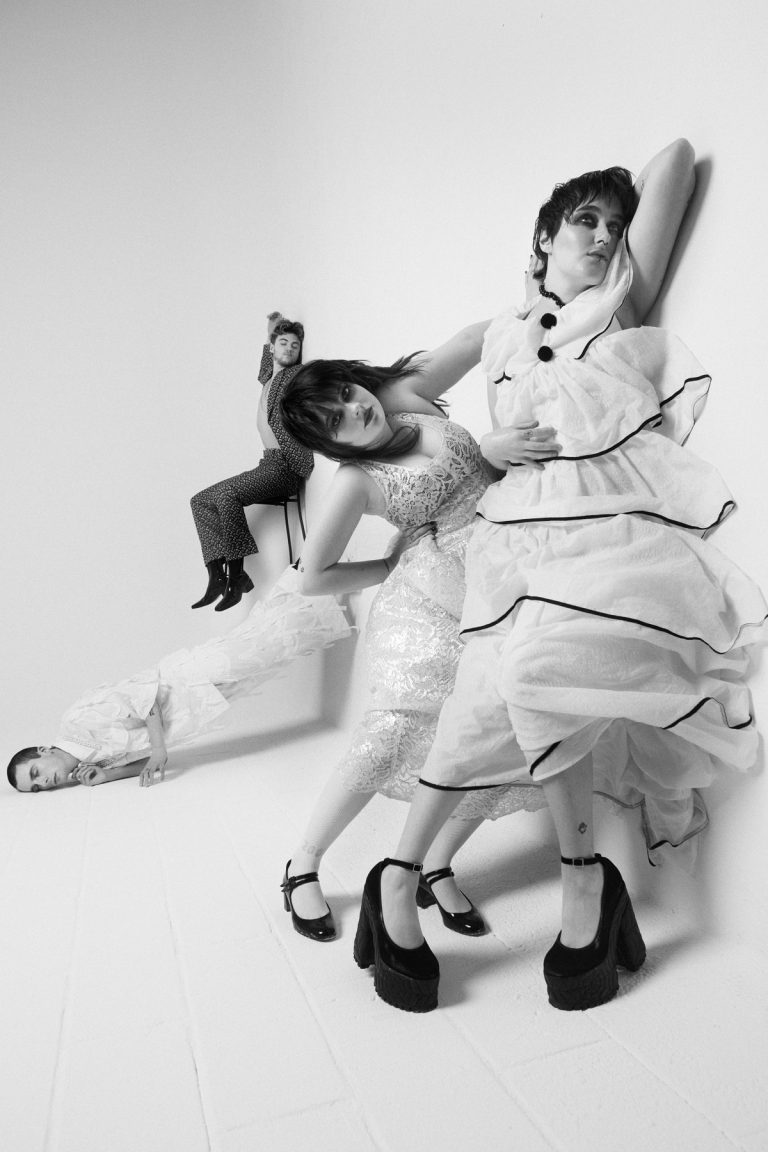
White Ribbons
Published: 2024/09/20
Updated: 2024/09/21
OLIVIA GAGAN: Hi. How are you doing?
JULIE DAWSON: I'm good. I'm a bit sick at the minute, but I'm good. This [Violet photoshoot] is the coolest shoot we've ever done. We usually wear a lot of Simone Rocha, and they pulled a lot of cool Simone pieces, so I’m buzzing to see the photos.
I'm curious about clothes and how that’s evolved for the band. Back when you were first starting, did you talk about what you wanted to look like?
We never spoke about image or what we wanted to wear at all. When we got the Simone connection, it was very important for the visual side of things. It elevated it to another level. But it’s a funny one – we didn't really know what we wanted to look like. Then Simone, being an Irish designer and drawing upon a lot of folklore, felt right, you know?
Done well, it's like an extension of you. It can be a facet of your art-making.
Completely. It’s a hard thing to nail but being in Simone just made sense.
How did that connection come about?
It was Hugh Mulhern, who directed two of our music videos. He's a good friend of ours. That was the initial connection. He introduced us to her and her clothes. We had no idea what we should be wearing for a video shoot, or anything like that. She’s been so good to us, whether it comes to playing live or needing stuff for shoots. It's the only way we've delved into that world of fashion. But it's been so cool.
Talking of visuals, the cover of your debut album, Madra, is so evocative and beautiful. It’s a porcelain doll with its face smashed. I find it confronting as well. It's an arresting image. Could you talk me through that choice?
The minute we saw that picture, we knew. It's just so striking. Some people say they hate it, some people say they absolutely love it, but either way, it is confronting, you know? We saw the picture, and it perfectly summed up the themes on the album. Fragility and the human condition. It felt so fitting. It’s by Joshua Gordon, an Irish photographer.
It made me think of – and I don’t know if I'm overreaching here – a Virgin Mary icon. They’re often made of plaster or china, so they get damaged or dented. There’s something quite disturbing about that image of perfection getting smashed. I didn't know if that was deliberate.
I hadn't thought of that before, but you're actually so right. It is very in that world. There's something haunting about it.
It also made me think of the idea of having a perfect image or face, which we're all expected to have, yet we’ve all been damaged or made imperfect in some way.
Exactly.
I'll come back to the music. I’m curious to hear where you're at, at the moment. You've just finished a small tour following Madra's release. How has your audience evolved? Do you ever look out at the crowd and go, ‘huh? I didn't expect this.’ Is it a process of discovery—finding out who your fan base is?
Totally. It's hard to connect with who’s listening when you're just seeing it online. Seeing people in real life is the moment when it all clicks. Initially, most of our audience was 6 Music [BBC Radio 6 Music] dads—you know, middle-aged men. Now, when I look out into the crowd, there's a lot more younger people, people my age. I remember going to see my favourite bands when I was 16, 17, and it being such a defining thing in my life. It's cool to think that we might be that for someone else.
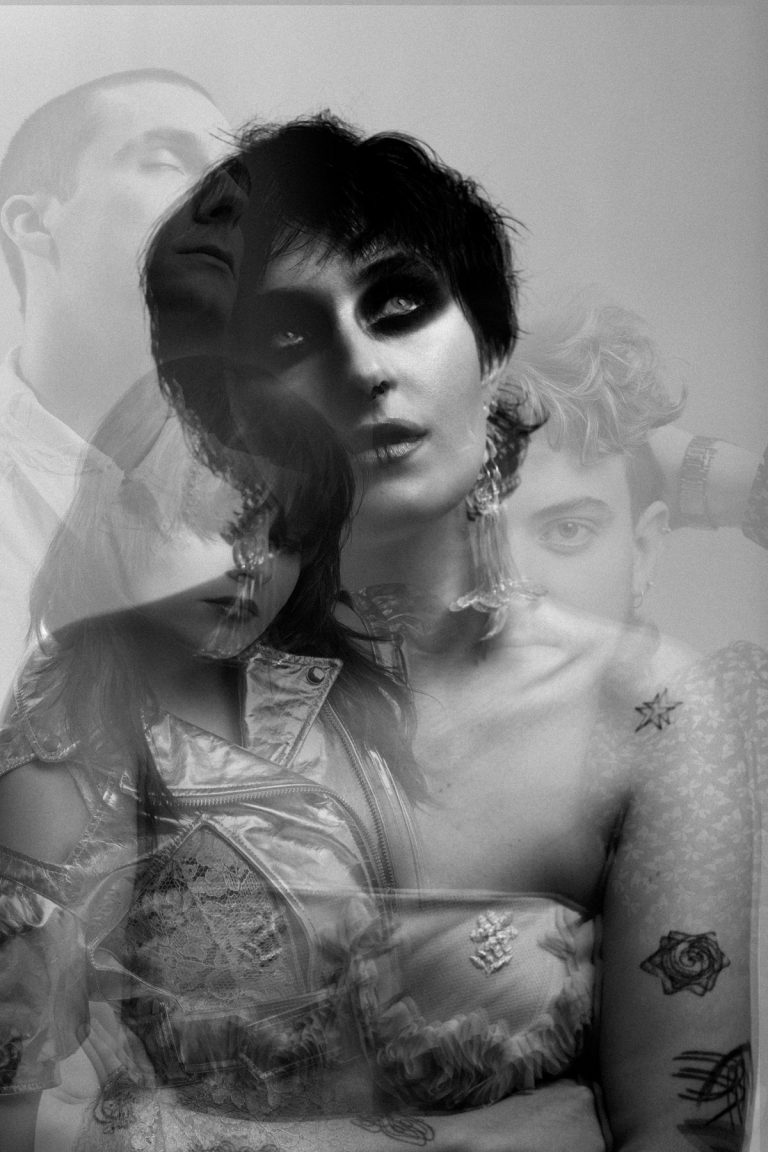
Julie wears dress by SIMONE ROCHA, earrings RILEYHAUS.
How do you think those younger people are finding you?
What's funny is that I think a lot of younger people who end up at the shows will be there with their dad or their mum, and they're like, ‘my parents showed me your music’. Obviously, we're encouraged to do TikTok and stuff, but genuinely, a lot of people have heard about us through their parents.
Is that a pressure you feel—to make music that sounds good online?
It's not something we ever considered when we were making the album, and it's not something I see us taking into consideration in the future. It's quite difficult to sum up a project that you've worked on for years and to try and cut that up into digestible little moments. If you're trying to take that into account, you're limiting yourself. It's a weird, weird world for music right now.
Talking about the album and the making of it, how was that? You were in Galway for a long time, that was your hometown. Galway has this huge reputation for traditional Irish trad music, and there's a scene that has always been around there for more alternative music. But Madra was recorded in London.
I think we needed that change of scenery to have more to say and more to explore, you know?
I wanted to ask about that. Because the Irish diaspora is a big part of Irish culture. Even if you’re not Irish and you're just a person who leaves home, it’s a universal experience. Sometimes, moving away is what it takes to get clarity on where you've come from.
Totally. That's something that we're exploring more now—the relationship that we have with home. It's not something I'd ever considered before I left. I find it such a difficult thing to put into words. Where you come from can be such a defining thing.
It's an identity thing, isn't it? There's so much made in the press of your Irishness and your Galway roots. Does that resonate with you as a band?
I think so. Especially once we moved to London. Most of the people we know over here are other Irish artists. It's like the minute you move away from home, you become 10 times more Irish [laughs], and those people mean it still kind of feels like home here in the UK.
Does it make you look at Ireland through a different lens?
It's changing all the time now. When I was in school, we were the only band in our school. Now, there's five bands in each year. The music scene is really blossoming over there. It’s a cool thing to see, because the reason we went for it was because we were seeing artists like Just Mustard opening for The Cure. We were like ‘man, they're just a group of Irish kids from Dundalk’.
So, they inspired you. I'm sure those kids at school saw what you guys were doing, and it makes it seem tangible and real, doesn't it?
Totally. It's easy to think that making music is unachievable. It seems very farfetched to think, ‘I could be a musician.’ None of us knew anyone who had succeeded in music.
What made you keep going?
When we started the band in 2017, we didn’t take it very seriously. We were just friends hanging out and playing music. Then, in 2019, we went to see The Cure in Malahide Castle, with Just Mustard opening for them. The Cure is our favourite band in the world. Seeing Just Mustard—these guys we had mutual friends with—and opening for them was a really, really important thing for us. It made us feel like we could do it, too. We had never felt that before; it was a big turning point. That was when we decided we wanted to release music and put all the money that we were earning from work into the band.
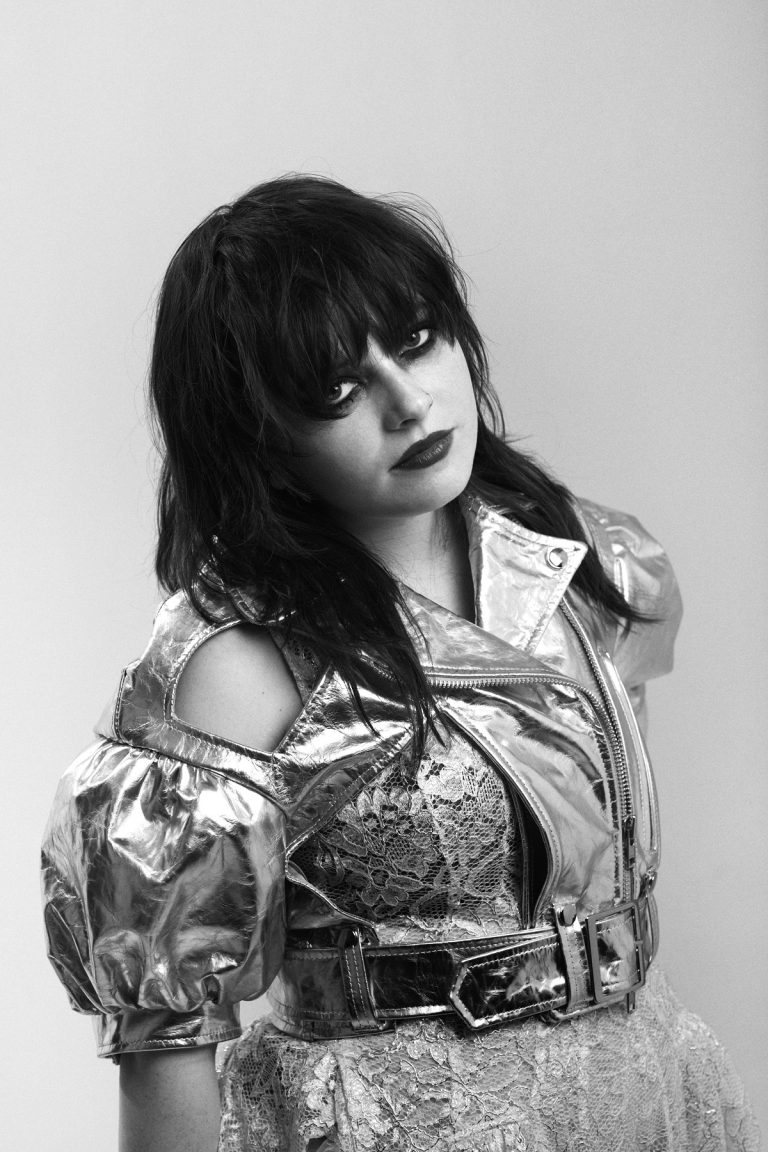
Cara wears clothing by SIMONE ROCHA.
Were you working a day job and then working on the band at night?
I was working full-time, and then whatever money I made from work, I was sending to [record producer] Chris Ryan to mix our tracks [laughs], and using it to buy equipment. I worked in an art house cinema that also had a cafe, so I'd work in the cafe and the box office. I did some ushering as well. I’ve had a few service industry jobs, and that one was really good. I actually miss it sometimes.
Sometimes, working a job that has nothing to do with what you're doing creatively can create space for you to think and dream. I'm not saying the pay or the hours are good. But I worked as a barista in [coffee chain] Caffe Nero for a year, and because I was doing a manual, repetitive job, repeatedly making coffee, it actually gave my brain space to form ideas.
I hear that. Music, as a job, is all over the place. There's so much time where you're so busy, and then there's serious lulls. That can be really difficult to create in. Having a concrete role—a place you have to go to every day—can be helpful. It's a weird one.
I wanted to ask why you went with Madra as the album title. ‘Madra’ means ‘dog’ in Irish…and black dogs in the English language are a metaphor for depression. I grew up on the Isle of Man, and there’s a local myth there of the moddey dhoo, a black dog that haunts people. I wondered if that was where you guys were going with that, the idea of depression as a black dog following you around. It seems to reoccur across cultures.
That's exactly why it felt so fitting. It felt like it really summed up everything in the album. It’s the idea of things that you can’t escape. That feeling of being followed just felt very fitting. We toyed with the idea of it being called [album track] 'White Ribbons', but that kind of felt like it could have been anyone's album name. We also wanted an Irish title. It was important to have that tie back to home. We all went to [Irish language schools] Gaelscoil; we grew up speaking Irish, and it felt nice to be able to bring that into the world, you know?
Would you like to have more Irish language in future tracks?
Yeah, I think so. I would like to try and write a song [in Irish]. We're not leaving it at 'Madra'.
Languages are living, organic, evolving things. But that also means they can die, right?
There was talk of that with the Irish language for a long time. We're from the west of Ireland, where we speak a lot of Irish. But a lot of our parents don't speak the language. It was not a thing that people really did. But our generation wants to speak it. It’s such a cool thing to have your own language, and I think people are finally enthused about it. I have no idea if that’s to do with music, like [Irish post-punk band] Fontaines D.C. writing songs in Irish. It's having this massive revival, which is fucking amazing. I'm so glad. It's sick.
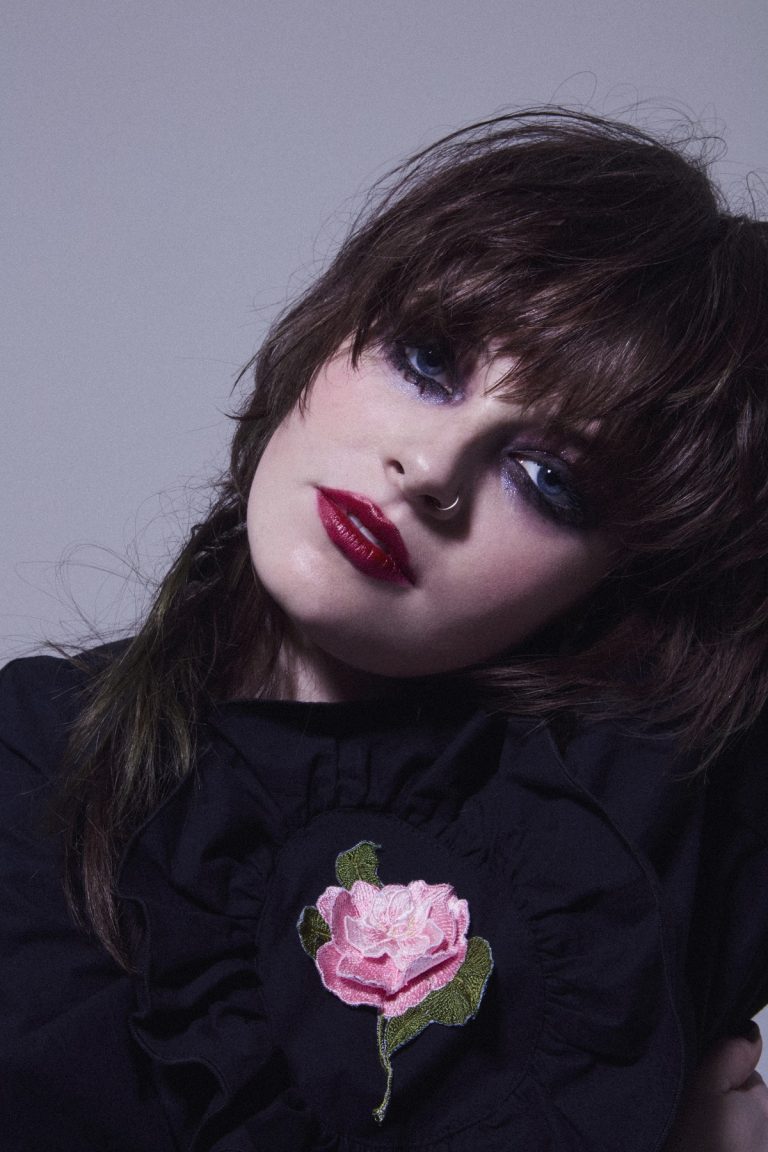
Cara wears dress by NAYA REA.
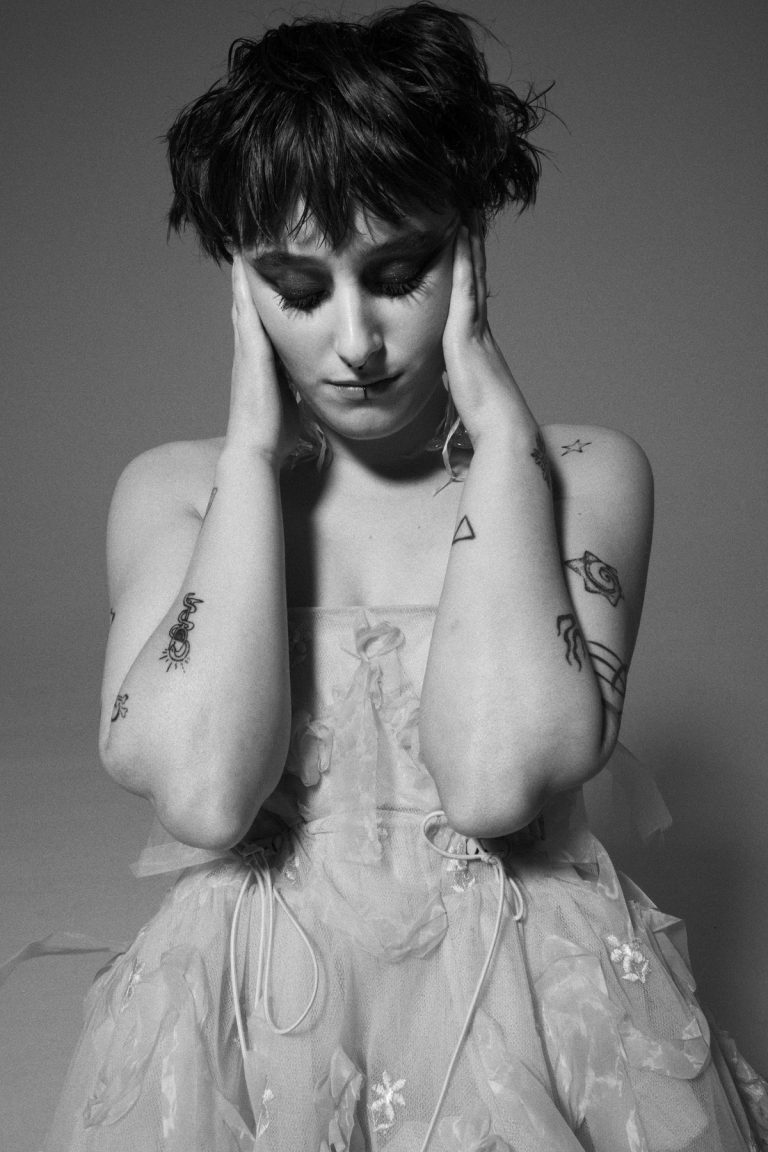
Julie wears dress by SIMONE ROCHA, earrings RILEYHAUS.
What music are you listening to? Who are you obsessing about?
Mannequin Pussy. I've been a fan for a while, and the new EP is absolutely incredible. I’m obsessed with them. I've been rewatching 'BoJack Horseman'. I've been finding it difficult to write recently, and I can really draw inspiration from that show and the characters.
What do you do when the words aren't coming easily? Do you go easy on yourself? Do you beat yourself up and get mad at yourself? Do you have faith that the words will come in time?
I've actually been having a serious dry spell when it comes to writing. I can be very patient with myself and think, ‘it will come’. But then, when I need to do it—when I've got a session planned and I can't just show up empty-handed – I never used to do this – but now, when I'm reading a book, I'll start marking each page that has a line that I find evocative. I’ll take that and then build upon the sentiment of it. I've been doing that a lot recently. It’s frustrating when you feel like that, but I think I'm coming out of that, which is a relief [laughs]. I hadn’t realised how worried I’d been about not having written anything.
Does your relationship to your songs change once they’re out in the wild? Your music sounds intensely personal. To me, it would be hard performing or singing that every night. I assume there’s a different relationship to a song when it just exists in like a note in your phone or in a notepad, versus when you've performed it 150 times.
Yeah. When it's out in the world, it's not yours anymore. It belongs to everyone. And seeing people resonate with them gives you a newfound appreciation for what they are.
Can you feel your sound evolving, or new influences starting to seep in?
Definitely. The move to London and settling in here now, 'cause Jesus, we've been here two years…we’re definitely inspired by the music we're exposed to over here. There's so much life here. That’s been inspiring the second album. Whenever we've been writing, there's things that are kind of cowboy, and then there's things that are really noisy, and then things that are folky and I have no fucking idea what route we're gonna take with it.
HAIR: RIO SHINMAKI. MAKE-UP: ELI WAKAMATSU. PHOTOGRAPHY ASSISTANT: PHILIP BANKS. FASHION ASSISTANT: KATY JARVIS.
Related Articles

Liberty 150 x150 curated by Leith Clark: The Founder Interviews

Liberty 150 x150 curated by Leith Clark: The Founder Interviews

Liberty 150 x150 curated by Leith Clark: The Founder Interviews

Liberty 150 x150 curated by Leith Clark: The Founder Interviews
